英語(yǔ)受拉丁語(yǔ)影響極為深刻,其語(yǔ)法、成語(yǔ)、格言、縮略詞等,都有拉丁語(yǔ)點(diǎn)綴其間。
所以,雙語(yǔ)君今天就來跟大家講一講英語(yǔ)中出現(xiàn)頻率較高的一些拉丁語(yǔ)。
1
etc. 等等
讀音 [?t'set?r?]

↑Etc.,當(dāng)我想不出別的例子的時(shí)候用的縮略語(yǔ)。
拉丁語(yǔ)et cetera的縮寫,意思是“and the others”。例句:
?He lists several things to bring for hiking, lent, flashlight, jacket, etc.
他列出了徒步旅行要帶的東西,帳篷,手電筒,沖鋒衣等等。
關(guān)于這個(gè)詞的使用,有幾個(gè)注意事項(xiàng):
? "etc."前面不可再加and,因?yàn)?et cetera"中的"et"就是“和”的意思。
? "etc."自帶的句點(diǎn)不能丟掉,"etc."后面可以直接添加標(biāo)點(diǎn)符號(hào);但如果 "etc."是句子的最后一個(gè)單詞,就不要再多加一個(gè)句點(diǎn)啦。
? "etc."不能指代人,指代人的是"et al."。
2
i.e. 也就是說、即
讀音 [,a?'i:]
這是拉丁語(yǔ)id est的首字母縮寫,即“that is”的意思,用來進(jìn)一步闡述一個(gè)名詞、觀點(diǎn)或陳述。
?Sandra Bullock is the new Will Smith, i.e., a star who can single-handedly carry a blockbuster.
桑德拉·布洛克就是新一代的威爾·史密斯,換句話說,是可以一個(gè)人撐起整部大片的明星。
?Service charge is included in all prices, i.e., you don't have to leave a tip.
所有的費(fèi)用都包含了服務(wù)費(fèi),也就是說,你不需要再給小費(fèi)了。
3
e.g. 舉例來說
讀音 [,i?'d?i?]
相當(dāng)于for example或for the sake of example,后面常跟一些例子。
?He was the school champion of many activities, e.g., chess, badminton, 110m hurdles, and high jump.
他是很多個(gè)項(xiàng)目的全校冠軍,比如國(guó)際象棋、羽毛球、110跨欄和跳高。
▌e.g.很容易和i.e.混淆。
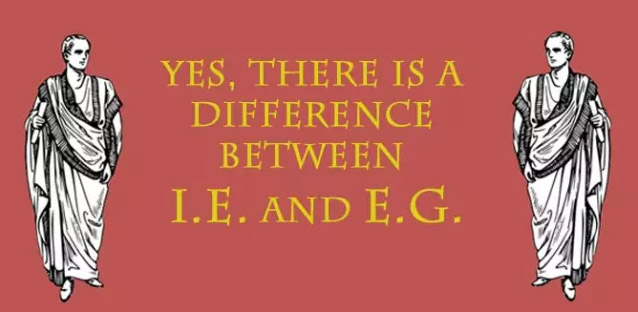
我們看一個(gè)例句就明白了:
? It happened in August, i.e., two months ago.
(i.e.= in other words)
? It happened in August, e.g., two months ago.
(e.g.= for example)
4
Per se 本身
讀音 [?p?? ?se?]
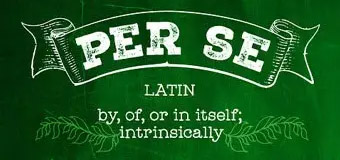
這個(gè)詞直譯成英語(yǔ)就是“by itself”或“in itself”,本身、本質(zhì)上的意思。例句:
?I don’t find chemistry boring per se, but this professor’s voice puts me to sleep.
化學(xué)這門課本身我并不覺得枯燥,可是這位教授的聲音著實(shí)讓我想打瞌睡。
5
Vice versa 反之亦然
讀音 [,vais 'v?:s?]
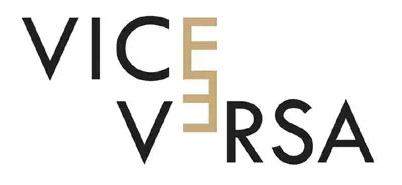
拉丁語(yǔ)意思是“to change”(改變) 或 “turn around ”(轉(zhuǎn)過來),在英語(yǔ)里指反過來也一樣。
英國(guó)作家塞繆爾·巴特勒(Samuel Bulter)的這句名言是個(gè)極好例句:
?In the midst of vice we are in virtue, and vice versa.
罪惡之中亦有美德,反之亦然。
6
Alter ego 另一個(gè)我(個(gè)性中的另一面)
讀音 [,??lt? 'i?g??]

這個(gè)詞是古羅馬政治家西塞羅(Cicero)創(chuàng)造出來的,本意是“a second self”或“another I”,很多人都有另一種人格,或者性格上隱藏的一面。
此外,這個(gè)詞還引申出知己、最信賴的密友等意思。
?He was my alter ego; we were always picking up each other's thoughts.
他是“世界上的另一個(gè)我”,我們總能夠思想相通。
7
Status quo 現(xiàn)狀
讀音 ['ste?t?s 'kw?u]

↑不要安于現(xiàn)狀……
從拉丁語(yǔ)“ the state in which”(處于某種情況中)而來,表示事物現(xiàn)有的狀態(tài),常常相對(duì)于另一種可能的狀態(tài)而言。
?He is content with the status quo and does not like change.
他滿足于現(xiàn)狀,不想改變。↑不要安于現(xiàn)狀……
從拉丁語(yǔ)“ the state in which”(處于某種情況中)而來,表示事物現(xiàn)有的狀態(tài),常常相對(duì)于另一種可能的狀態(tài)而言。
?He is content with the status quo and does not like change.
他滿足于現(xiàn)狀,不想改變。
8
De facto 事實(shí)上的
讀音 [di:'f?kt?u]
這個(gè)詞指的是實(shí)際上存在的情況,通常還暗指事情本不應(yīng)該如此,或這個(gè)現(xiàn)狀并不合法。例如,
?Legally, employers are not allowed to discriminate in hiring because of age, but many still practice de facto discrimination.
從法律上來說,在雇傭員工的時(shí)候不允許有年齡歧視,但事實(shí)上很多公司都有年齡歧視。
?Although his title was prime minister, he was de facto president of the country.
雖然他的頭銜是首相,但實(shí)際上是國(guó)家的元首。
9
Ergo 因此,所以
讀音 ['??g??]
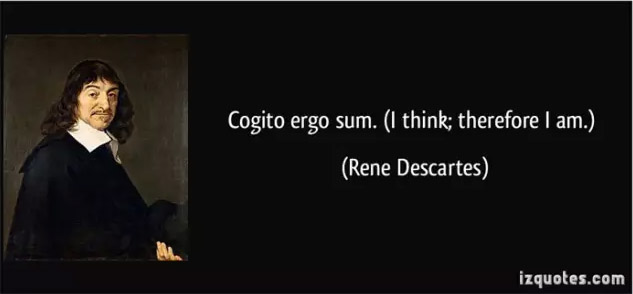
↑ 拉丁語(yǔ),我思故我在。(勒內(nèi)·笛卡爾)
Ergo可以替換英語(yǔ)中同樣意義的“therefore”、“hence”。所以,
I think, therefore I am.
我思故我在。
也可以說成,
I think, ergo I am.
它通常用來表達(dá)邏輯推理的結(jié)論。
?Birds are warm-blooded animals, and reptiles are cold-blooded animals; ergo, no bird is a reptile.
鳥是溫血?jiǎng)游铮佬袆?dòng)物是冷血?jiǎng)游铮裕B不是爬行動(dòng)物。
10
Curriculum vitae 簡(jiǎn)歷
讀音 [k??r?kj?l?m'vita?]
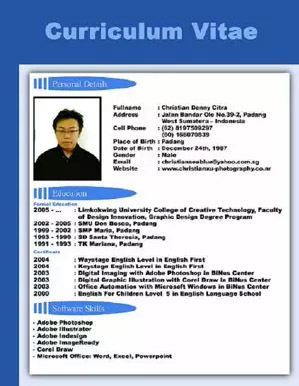
直譯成英語(yǔ)就是“ the course of one’s life” (生命歷程),常縮寫為CV。
?You need to make a good CV to seek a job.
找工作時(shí)你要做個(gè)漂亮的簡(jiǎn)歷。
11
Versus 對(duì)抗
讀音 ['v??s?s]

經(jīng)常縮寫為vs.,用來指對(duì)立的雙方,或兩種觀點(diǎn)、事物的比較,例如,
?traveling by plane versus traveling by train
乘飛機(jī)和乘火車的利弊權(quán)衡
12
Per capita 每人,按人頭
讀音 [p? 'k?p?t?]
直譯成英語(yǔ)就是“by heads”或“for each head”,按人頭,也就是每人的意思。 GDP Per capita就是人均國(guó)內(nèi)生產(chǎn)總值(人均GDP)。
例句:
?As per capita income goes up, the growth sector seems to be in the top-end.
由于人均收入不斷增高,增長(zhǎng)快速的領(lǐng)域似乎都集中在高端商品。
13
Alma Mater 母校、校歌
讀音 ['?lm?'mà:t?]
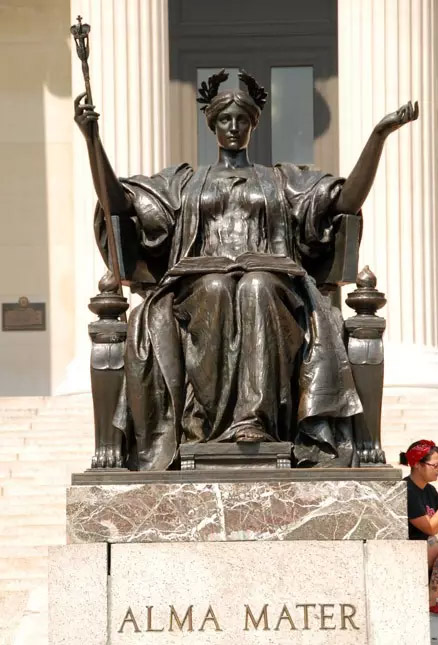
這個(gè)詞直譯成英語(yǔ)就是"nurturing mother"(育養(yǎng)之母),用來指畢業(yè)前就讀的學(xué)校,尤指大學(xué)。
此外,Alma mater還有校歌的意思。
?He has fond feelings for his Alma Mater.
他對(duì)自己的母校有著深厚的感情。















